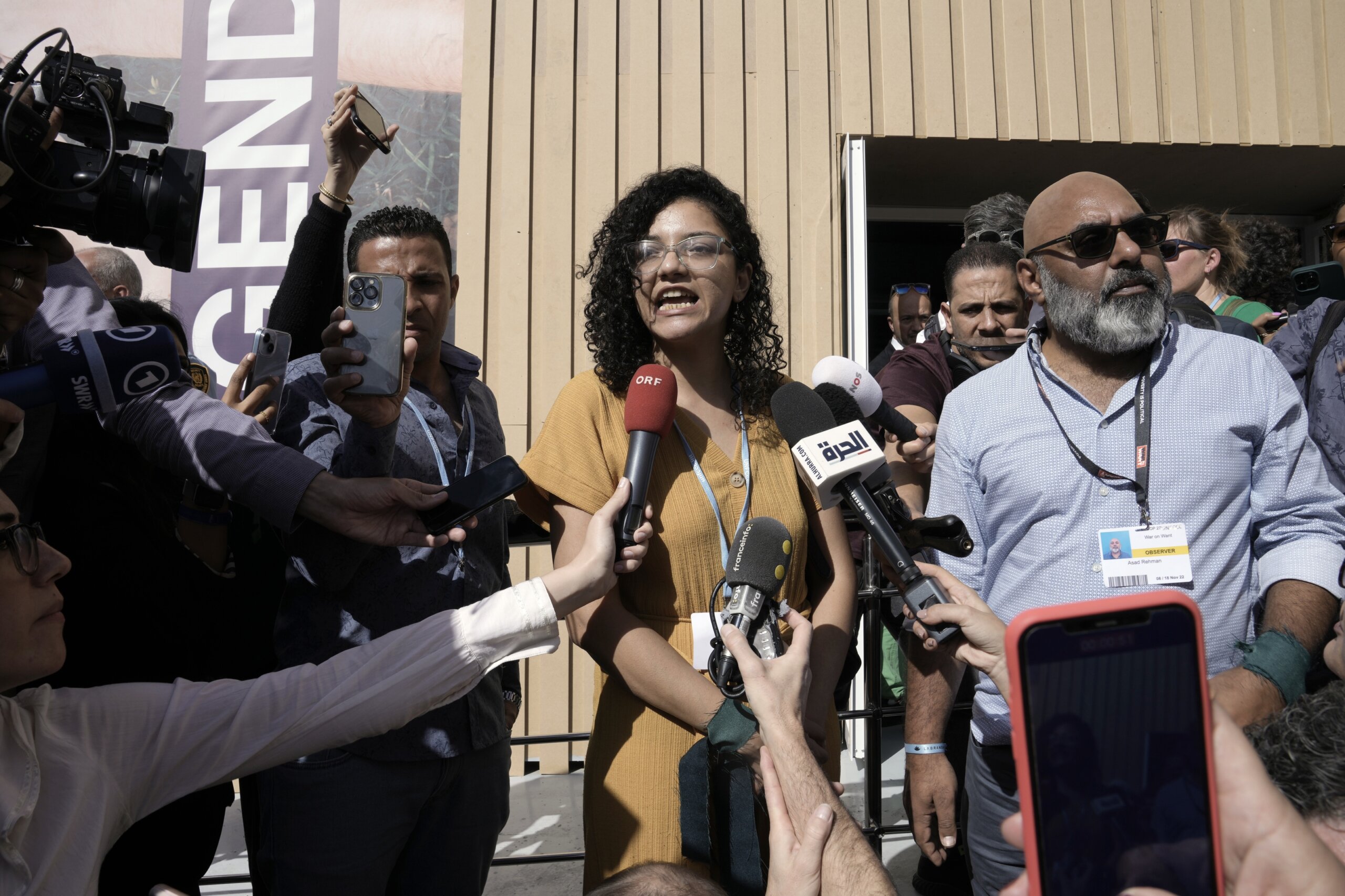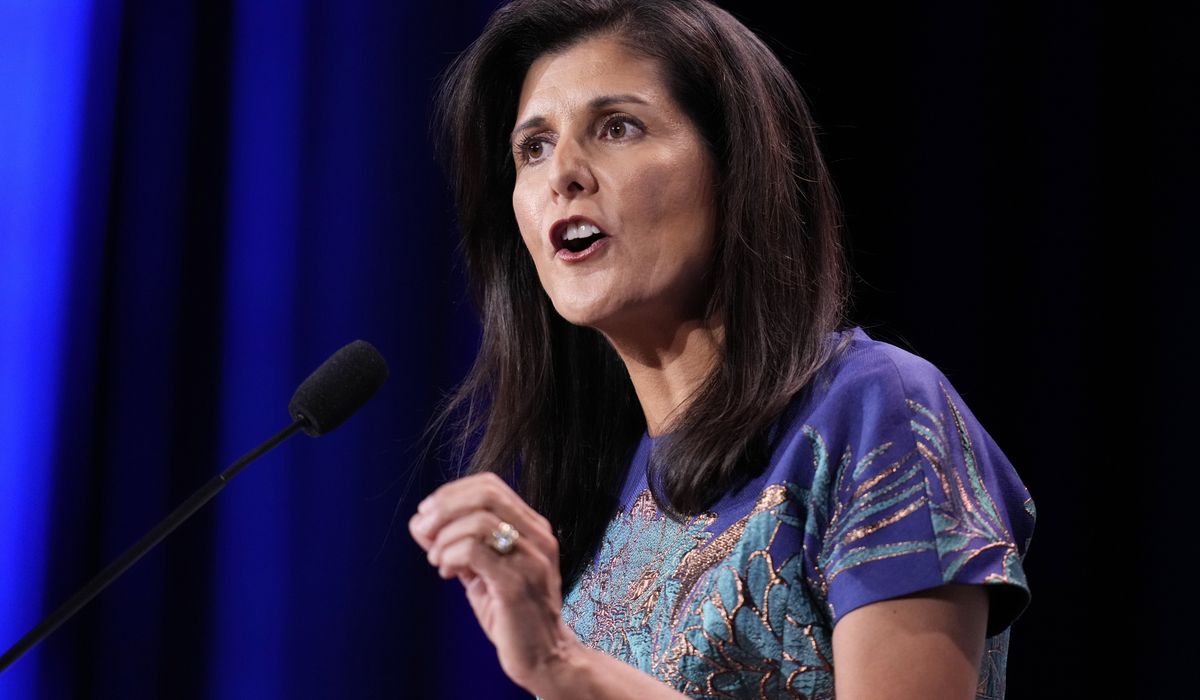SHARM EL SHEIKH, Egypt (AP) — The family of one of Egypt’s top jailed pro-democracy activists warns that the clock is ticking…
SHARM EL SHEIKH, Egypt (AP) — The family of one of Egypt’s top jailed pro-democracy activists warns the clock is ticking on his life as they ask world leaders at a U.N. climate conference to pressure Egypt to release him.
Alaa Abdel-Fattah, who spent most of the past decade in prison for criticizing its leaders and was sentenced to another five years last year for a retweet, has gone on a months-long hunger strike. He stopped eating calories completely and then stopped drinking water on Sunday, the first day of the conference.
Sana Seif, his younger sister, said on Tuesday that the family fears the Egyptian government may force-feed her brother to survive to avoid the embarrassment of his death while the country is in the international spotlight.
“Force feeding is torture. Nothing should happen against his will as long as he can say it,” she told The Associated Press on the sidelines of a conference in the seaside resort of Sharm el-Sheikh.
Seif, who was also jailed in Egypt for her activism in the past and now lives in Britain, came to Sharm el-Sheikh to raise her brother’s cause, speaking to international media and other activists. Amnesty International has warned that he could die within days if he is not released.
The family pressed the British government to release Abdel-Fattah and return him to the UK, where he also holds citizenship. In a letter to his family announcing the water strike, Abdel Fattah said he was convinced the Egyptian government had no intention of releasing him and that the focus of the conference was the only opportunity to force his case – and that he was ready to die , if not released.
“I want to be here to remind them (world leaders) that this man is dying there and you are all complicit. And you will have blood on your hands. And that’s why I’m here,” Seif said.
Meeting in Sharm el-Sheikh, British Prime Minister Rishi Sunak, French President Emmanuel Macron and German Chancellor Olaf Scholz raised the activist’s case in their talks with the Egyptian leader, their offices said, although Sunak avoided press questions on the matter.
Abdel Fattah has gained notoriety for decades of pro-democracy activism, most notably during the 2011 uprisings that ousted Egyptian President Hosni Mubarak and spread to other Middle Eastern countries.
For many, his imprisonment was another sign of Egypt’s return to autocratic rule under President Abdel Fattah al-Sisi, a close ally of many Western governments. Since 2013, el-Sisi’s government has cracked down on dissent, arresting thousands of people and imposing severe restrictions on independent groups and the media.
Days before the start of the climate conference, another imprisoned activist, Alaa al-Salmi, died in prison after a two-month hunger strike, his family said. Rights groups say poor conditions and abuse are common in Egypt’s prisons, and many have died in custody.
Abdel-Fattah has been jailed multiple times under various governments for civil rights lobbying. After El-Sisi’s government virtually banned protests, he served a five-year prison term on charges of taking part in an unauthorized protest and allegedly assaulting a police officer.
He was released in 2019, but was arrested again a few months later after retweeting the death of another inmate. At the time, authorities arrested dozens of activists after a rare outbreak of anti-government protests — though most, like Abdel Fattah, did not participate. In December, he was found guilty of spreading false news and sentenced to another five years in prison.
For the second day on Tuesday, his mother Laila Swaif went to the prison where his son is being held to get proof that he is still alive. On Monday, she waited for many hours outside the prison for a letter from Abdel-Fattah, but she was told that he refused to write it.
The return was also a risk for Seif. On her last visit to Cairo, security officials detained her at the airport for several hours before allowing her to enter. She said no one stopped her when she arrived in Sharm el-Sheikh on Monday and she was not harassed. She said she saw that she was being followed.
“I stopped doing those calculations … because if you don’t have a lot of choices left, you really have nothing to lose. And this is where the Egyptian regime put us,” she said.
At a press conference she gave on Tuesday, a pro-government Egyptian lawmaker tried to disrupt the proceedings by taking the microphone and shouting that her brother was a criminal, not a political prisoner, and that she was inciting foreign governments against Egypt. UN security removed him from the room.
Hossam Bahgat, a leading Egyptian human rights activist and executive director of the Egyptian Initiative for Personal Rights, called on all COP27 participants to highlight what he called a “full-scale human rights crisis” in Egypt.
“We ask them to join our demands for the Egyptian government to speed up the release of political prisoners and save the life of Alaa Abdel Fattah and release him,” he said.
Western governments have long been reluctant to press El-Sisi’s government hard on human rights issues, and their officials often argue that backroom negotiations are more effective in securing the release of prisoners.
Macron said El-Sisi had told him during their meeting that he wanted “his health to be preserved.”
“I say this with great caution, I hope that the coming weeks and months will bring results,” said the French president.
Egyptian Foreign Minister Sameh Shukri gave no indication that Egypt was considering a release.
Speaking to US news channel CNBC, Shukri said Abdel-Fattah would be given “the medical care available to all prisoners”. He said the hunger strike and water strike were “a matter of personal choice” and suggested it may not be valid. He also suggested that the Egyptian government does not officially recognize his British citizenship.
The safe was skeptical.
“The solution is very, very simple: either put him on a plane to London or give him consular access. Let the British Embassy see him,” she said. “I don’t trust the prison authorities.”
She doesn’t think about the worst case scenario: her brother’s death.
“It’s not over until it’s over. As long as he is still breathing alive, he can be saved. And that’s the only thing I think about,” she said.
Copyright © 2022 The Associated Press. All rights reserved. This material may not be published, broadcast, written or distributed.







